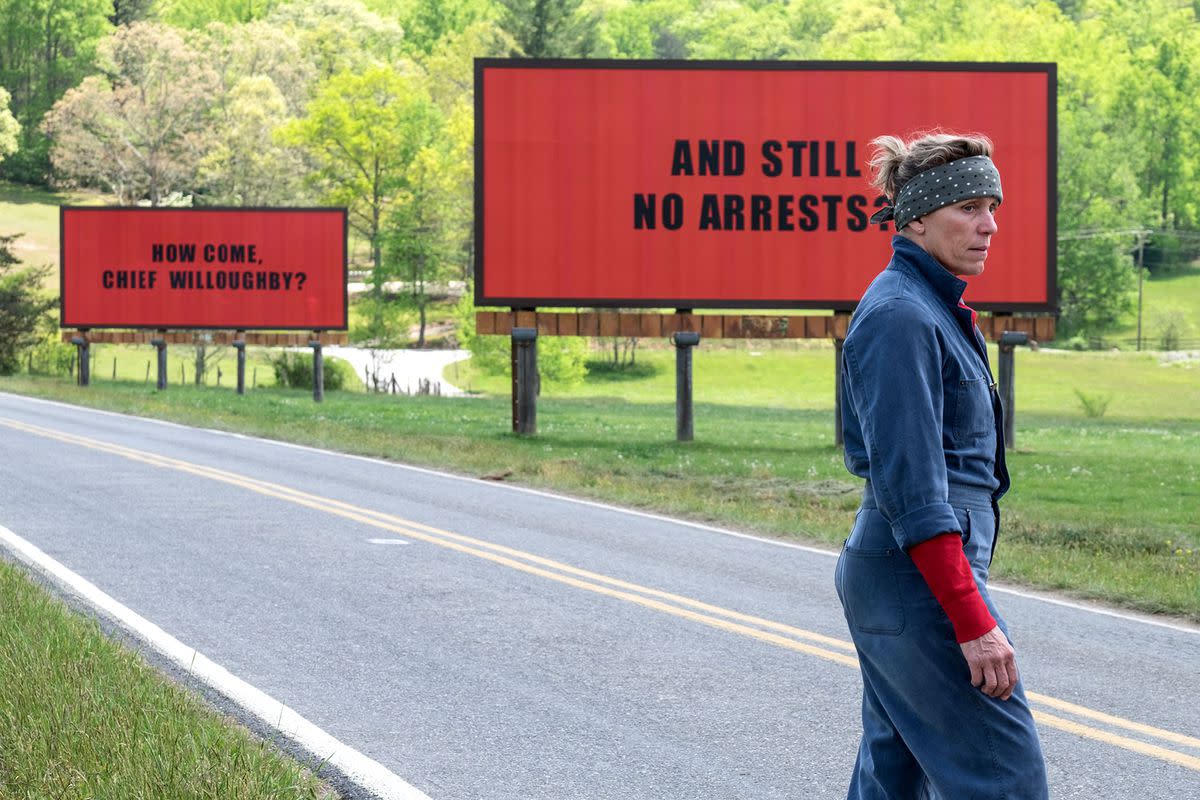
Deeply emotional and darkly humorous, “Three Billboards” is a messy drama, designed to ignite an internal moral conflict within its viewers. It is a dark script, and the humor within makes one question whether they should find it funny or be deeply disturbed. Set in the fictional town of Ebbing, Missouri,Three Billboards focuses on a contemporary, white, blue-collar community in the deep South.
The film follows Mildred Hayes (Frances McDormand) as she seeks justice for her daughter’s brutal assault and murder, and in turn, find closure for herself. She rents three billboards that question whether the town’s sheriff, Bill Willoughby (Woody Harrelson) has done enough in pursuing her daughter’s killer. These billboards create conflict between her and her son, as well as the brutish and corrupt Officer Jason Dixon (Sam Rockwell)
The writing shines in “Three Billboards.” Intricately woven layers of complex social commentary on a variety of topics take aim at rape culture and police brutality; the commentary hopes to promote racial discourse. It forces a viewer to evaluate their own sense of morality, by attempting to redeem characters who perhaps are unredeemable. It turns on a dime, leaving viewers without solid moral ground, placing them in a perpetual grey area.
The theme of complex morals and redemption is most easily identified in the character arc of Officer Dixon. In the beginning of the film, the audience receives the impression that Dixon tortured a black man in his custody; later we see him throw Red (Caleb Landry Jones), the man who rents the billboards, out of a window. By the end of the film however, Dixon and Hayes have found a mutual respect for one another, and although they are not friends, they are begrudging allies. This revelation is one that a viewer struggles with; can Dixon’s newfound virtue compensate for his previous misdeeds?
Carter Burwell’s original soundtrack for “Three Billboards” complements the film perfectly. At some points, the music is extremely subtle and nearly unnoticeable, but at other times can be blatantly or even painfully obvious. The style and timing of the music truly make this film a dark comedy — uplifting, perky operas are sometimes sung in scenes of sadness or violence, and when there is no music at all, the brutality of the film grounds the viewer in reality.
Throughout the film, director Martin McDonagh, who most recently won a Golden Globe for Best Screenplay, for his work on Three Billboards uses mostly close-up shots to portray intimate interactions between characters. These shots are extremely effective, but can make the film somewhat slow depending on how well the viewer follows the characters’ relationships with each other.
The characters of Hayes, Willoughby, and Dixon are portrayed masterfully by Frances McDormand, Woody Harrelson, and Sam Rockwell, respectively. They are not overly dramatic, leaving some room for the audience to guess their thoughts. One interference is Woody Harrelson. By no fault of his own, his face has become associated with his previous clowny characters — there is some initial difficulty in dropping this image and taking up his more serious role as the chief of police.
McDonagh beautifully weaves together vengeance, growth, race, and brutality to create a stunning masterpiece in ‘Three Billboards Outside Ebbing, Missouri.’
‘Three Billboards Outside Ebbing, Missouri’
1 hour, 55 minutes
Rated R for violence, language throughout, and some sexual references
Directed by Martin McDonagh



